#Three Act Structure
Explore tagged Tumblr posts
Text
Ok, I think I might be exiting the "are you fucking kidding me?" period and ready to make a real argument, so lets talk about Three Act Structure!
Is OFMD S2 just the "Darkest Hour"?
A very common explanation I've been seeing for some of the... controversial... aspects of S2 is that it's meant to be that way. That the middle act is where the protagonists hit their lowest point. Where we get the big failure point. Where everything looks kind of shit.
S2 is supposedly just that point. It's The Empire Strikes Back. People have been making that comparison since before the first episodes even dropped, telling everyone to expect something that could be disappointing or unsatisfying - it's just a matter of needing to wait for S3 to pull it all together.
It's not a baseless framework to consider the show through - I'm pretty sure David Jenkins has mentioned it in interviews (or at least mentioned he planned for three acts / seasons) so it's certainly worth asking how he's doing at the 2/3rd mark.
So - quick summary of Three Act Structure:
Act 1 introduces our characters and world. It includes the inciting incident of the story and the first plot point, where a) the protagonist loses the ability to return to their normal life, and b) the story raises whatever dramatic question will drive the entire plot. Act 2 is rising action and usually most of the story. The protagonist tries to fix things and fucks them up worse, in the process learning new skills and character developing to overcome their flaws. Act 3 is the protagonist taking one more shot, but this time they are ready. We get the climax of the story, the dramatic question gets an answer, and then the story closes.
If you want examples, the Star Wars Original Trilogy is a very popular template. And, hell, he said it was a pirate story... the main Pirates of the Caribbean trilogy also does a solid job with their three acts.
Let's compare. (Spoiler: I'm not impressed 🤨)
---
First thing I need to establish... Wait. Two things. First is that Three Act Structure is flexible, so we can't really analyze success or failure by pulling up a list of necessary plot beats that should have been hit in X order. Second is that if you tell me you are writing a romance with a Three Act Structure - where "the relationship is the story" - the first thing I'm going to do is ask you how you are adapting it. Because while there's not necessarily anything preventing you from applying this to a character driven plot, most people are familiar with it as plot structure for externally driven conflict.
Unless there's a reason the status of the main relationship is intrinsically tied up in the current status of the war against the evil empire, a standard Three Act Structure is going to entail either an antagonistic force that absolutely wants your main couple apart being the main relationship obstacle OR the romance aspect being a subplot to the protagonist's narrative adventure. None of those sound like how the show has been described.
So how is OFMD adapting it?
---
Act 1
(Can't figure out how well Act 2 is doing if we don't start at setup.)
Right out the gate, OFMD breaks one of the main "rules" for a story where the Acts are delivered in three parts. Namely the one where the first Act is treated as an acceptable standalone story, with it's own satisfying yet open ended conclusion.
In Star Wars, A New Hope ends with the princess rescued, Luke finding the Force, Han finding his loyalty, and the Death Star destroyed. The Empire isn't defeated, the antagonists still live... the story is not over, but this one movie doesn't feel unfinished.
Similarly, Curse of the Black Pearl gives Jack his ship back, Elizabeth and Will get together, and Norrington has the English Navy let them all off the hook and give Jack and the pirates one day's head start.
OFMD's final beat of S1 being Kraken Arc starting is not that, even if Stede returning to sea is still a pretty hopeful note. Now... I don't necessarily think this was a bad call. At least, not if the story is the relationship. It's easy to close on a happy ending and then fuck it up next movie if the conflict is external and coming for them. Not so much if you're driving the story with your protagonists' flaws, in part because it should be really obvious at the end of setup that your main characters need development and can't run off together right now. I actually like that they were risk-takers and let S1 look at the situation clearly vs doing a fragile happy end, because it takes into account the difference between a character-driven and plot-driven narrative.
I think OFMD's Act 1 actually ends at maybe the Act of Grace? Well, there through the kiss on the beach, counting as our "first plot point" before everything goes wrong, basically.
At that point, they have setup the story and characters. We've been introduced to Edward and Stede's current issues. Signing the Act of Grace does make the intertwined arcs between them real - it's no longer a situation that either one of them could just walk away from like it was in 1x07 - and we narrow in on the (alleged) driving question of the show:
It's not about "Will Stede become a great pirate?" or "Will we develop a better kind of piracy for the crew?" - the show is the relationship and the big question is "What is Stede and Edward's happy ending?"
Act 1 ends on their first solution, being together and making each other happy and admitting it's more than just friendship. Act 2 starts, appropriately, by saying both of them are currently too flawed for that to go anywhere but crashing and burning.
Now... looking back, what does Act 1 do well vs poorly?
I think it's really strong on giving us the foundation for BlackBonnet's characters and flaws. We aren't surprised Stede goes home or Edward goes Kraken (or at least... we weren't supposed to be surprised. There are still a lot of holdouts blaming Izzy for interrupting Edward's "healing" despite how at this point in the story it doesn't make sense for Edward to have the skills to heal... but I digress). The relationship question is compelling at the end of S1, the cliffhanger hooks, and the fandom explosion of fics did not come from nowhere - the audience was invested.
I also think Act 1 does a great job of settling us in the universe. We understand the rules it abides by, from how gay pirates are just a fact of life to how there's no important organs on the left side of the body. Stede has a muppety force field. Rowboats have homing devices, and port is always as close as you want it to be. Scurvy is a joke. The overblown violence of pirate life is mostly a joke, but we are going to take the violence of childhood trauma seriously.
Lucius's fake-out death, while technically part of Act 2, works well because Act 1 did a good job of priming everyone to go "obviously this show wouldn't kill a crew member for shock value, and we're 100% supposed to suspend disbelief about how he could have survived getting flung into the sea in the middle of the night." And we do. And we get rewarded for it.
Regarding antagonists - a big focus of any setup - the show is deliberately weak. The one with the most screentime is Izzy, and he's purposefully ineffective at separating our main couple. Every antagonist is keyed to a particular character, and they function mostly to inform us of that character's flaws and development requirements. The Badmintons tell us about Stede's repression and feelings of inadequacy, and Izzy tells us about Edward's directionless discontent and tendency to avoid his problems. Effectively - the show is taking the stance this will be a character driven narrative where Stede and Edward's flaws are the source of problems and development the solution. No person or empire (or social homophobia) is separating them...
...which leads me to something not present - there nothing really about the struggle of piracy against the Empire. Looking at Curse of the Black Pearl... we see piracy is in danger. The Black Pearl itself is described as the last great pirate threat the British Navy needs to conquer. Hangings are omnipresent - Jack is sentenced to die by one almost as soon as he's introduced to the story, when his only act so far had been to wander around and save Elizabeth from drowning. OFMD tries to invoke this kind of struggle in 2x08, but there's no foundation. Our Navy antagonists are Stede's childhood bullies, and so focused on Stede the crew isn't even in danger when they get caught. The Republic of Pirates is getting jokes about being gentrified, not besieged.
Even the capture of Blackbeard by the Navy is treated as a feather in Wellington's cap but not a huge symbolic blow against piracy... because we just do not have that grand struggle woven into Act 1. You only know the "Golden Age of Piracy" is ending if you google it, or have watched a bunch of pirate shows.
Overall, a solid Act 1, well adapted to the kind of story they've said they were looking to tell - a romance in the (silly-fied) age of piracy, instead of a pirate adventure with a romantic subplot.
---
Now, Sidebar - Where is the story going?
The thing about the dramatic question - in OFMD's case: "What is Stede and Edward's happy ending?" - is that a) there's normally more than one question bundled up in that one + sideplots, and b) while you aren't supposed to have the answer yet, you can usually guess what needs to happen to give you the answer.
Back to our examples... Luke's driving question is "Will the Empire be defeated?" Simple. Straightforward. Also: "Will Luke become a Jedi?" The eventual climax of our story from there is pretty obvious... the story is over when Luke wins the war for the Rebellion in a Jedi way. That's the goal that they are working toward.
Pirates of the Caribbean is a bit more complicated. We're juggling more characters and have a less defined heroic journey, but there are driving questions like "Is Jack Sparrow a good man?" and "Is Will Turner a pirate / what does that mean?" and even "Will the British Navy defeat piracy?" They get basic answers in Curse of the Black Pearl, and far more defined ones in At World's End. Still, this is another plot-driven narrative. They've laid the foundations for the Pirates vs Empire struggle, and when that final battle turns into the trilogy climax then you know what's happening.
OFMD is not doing a plot-driven narrative. To judge how they are doing at their goals, we have to ask what they think a happy ending entails in a character sense.
Clearly it's not the classic romantic sideplot, where the climax is the first kiss / acknowledgement of feelings. They've teased a wedding in Word of God comments a lot, so that's probably our better endpoint. Specifically, though, a wedding where both of our protagonists aren't ready to flee from the altar (big ask) and where they've both grown enough that their flaws / mutual tendencies to run away from life problems won't tank the relationship.
In Stede's case it's still massive feelings of inadequacy and being too repressed to talk about his problems. Also he ran away from his family to chase a lifelong dream of being a pirate - "Is Stede going to find fulfillment in being a pirate captain, or will the real answer be love?" Edward meanwhile expresses a desire to quit piracy and retire Blackbeard, but we also find out he's struggling with massive self-loathing and guilt from killing his father - "Is retiring what Edward wants to do, or is he just running away?"
If they are going to get to a satisfying wedding beat at the climax of their story, what character beats do we need to hit in advance?
Off the top of my head - both characters need to self-realize their flaws (a pretty necessary demand of anyone who runs away from problems). They are set up to balance each other well, but also to miscommunicate easily. They have to tell each other about or verbally acknowledge that self-realization so it can be resolved. Stede has to decide how much being a pirate means to him. Edward has to decide if he's retiring and what he wants to do. They both need to show something to do with getting past their childhood traumas given all the flashbacks. Through all this, they also need to hit the normal romance beats that convince the audience they are romantically attracted to each other and like... want to get married.
Oh, and this is more of a genre-specific sideplot, but once they demonstrate a behavior that hurts the people who work for them, they need to then demonstrate later how it won't happen again. Proof of growth, which is kind of important in a comedy where a lot of the humor is based in them being massively self-centered assholes. Stede doesn't earn his acceptance in the community until he kicks Calico Jack off the ship, making up for causing the situation with Nigel in the first episode. A workplace comedy can get a lot of material from the boss as the worker's antagonist, but if you want the bosses to stay sympathetic you have got to throw them some opportunities to earn it.
All that sounds like a lot, but like - the relationship is the story, right? If we spend so much time on establishing flaws big enough to drive a story, we also have to spend time on fixing them. Which is where the turning point hits.
---
Act 2: How it Starts
This is where the full story reality-checks your protagonist. Glad you saved your boyfriend and embraced new love in Act 1, but his repressed guilt means he's about to completely ghost you, and your own abandonment issues and self-loathing are about to make his dick move into everyone else's problem.
Again, it's a non-conventional choice OFMD has this start at the very end of S1 rather than with a sudden dark turn in the S2 premiere, but it's still pretty clearly that point in the Three Act Structure.
In Star Wars, The Empire Strikes Back opens with a timeskip to our Rebellion getting absolutely crushed and hiding on a miserable frozen planet. The Empire finds them as the plot is kicking off and they have to desperately flee. They get separated. Han and Leia try to go to an ally for help and end up in Vader's clutches. It's a sharp turn from the victorious note that A New Hope ended on.
Pirates of the Caribbean's Act 2 starts dark. Dead Man's Chest opens with our happy couple Will and Elizabeth getting arrested on their wedding day for the "happy end" escape of the last movie. Jack has not been having success since reclaiming his ship, and we'll soon find out he's being hunted by dark forces. As for the general state of piracy, we get a horrifying prison where pirates are being eaten alive by crows, and a new Lord Beckett making the dying state of piracy even more textual. "Jack Sparrow is a dying breed... The world is shrinking."
The key here is making a point that our heroes aren't ready. This is the struggles part - things they try? Fail. The odds do not look to be in their favor.
Now, OFMD apparently decided to go all-in on flaw exploration, especially with Edward. The first 3 episodes of S2 are brutally efficient in outlining Edward's backslide. In S1 you could see he had issues with guilt and feeling like a bad person. S2 devolves that into a destructive, suicidal spiral where Edward forces his crew into three months of consecutive raids, repeats his shocking act of cruelty with Izzy's toe offscreen (more than once!), escalates it with his leg, and finally they state directly that Edward hates himself for killing his dad so much that he fears he's fundamentally unlovable and better off dead.
Stede's struggles are subtler, but most definitely still there. He's deliberately turning a blind eye to tales of Edward's rampage, half from simply being too self-centered to care about the harms Edward causes others, and half from being unable to face or fathom that he had the ability to hurt Edward that much. Upon reunion he wants to put the whole thing behind them, not addressing why he left in the first place. Very "love magically fixes everything" of him, except Stede is no golden merman.
Interestingly, here, BlackBonnet's relationship dysfunction has very clearly been having a negative impact on the surrounding characters we care about. Make sense, since it's the driving force of the story, but that also adds a lot more relationships we need to make right. Like... Edward is the villain to his crew. The show focuses on their trauma and poisoned relationships with him. And then draws our attention even more to Stede taking his side to overrule their objections to him.
For a story where the conflict and required resolutions are primarily character based, and the setup had already given the main couple a good amount to work with, dedicating a lot of S2 to adding more ground to cover was... a choice. Potentially very compelling on the character end, certainly challenging on the writing end... but not a complete break with the structure.
Bold, but not damning.
---
Act 2: How it Ends
Now it is true that Act 2 tends to end on a loss. Luke is defeated by Vader and loses his hand, and Han has been sent away in carbonite. Jack Sparrow for all his efforts cannot escape his fate, and he and the Pearl are dragged to the locker.
But the loss is not the point. The loss is incidental to the point.
Act 2 is about struggles and failure, but it's also about lessons learned. There's a change that occurs, and our cast - defeated but not broken - enters the final act with the essential skills, motivation, knowledge, etc. that they lacked in the beginning.
Luke Skywalker could not have defeated the Empire in Return of the Jedi until he'd learned the truth about his father and resisted the Dark Side in The Empire Strikes Back. (Ok, confession, I'm using Star Wars as an example because literally everyone is doing so, but frankly it's a better example of formulaic Three Act Structure repeating within each movie because on a trilogy level - relevant to this comparison - it is a super basic hero's journey in a very recognized outfit and as such the Act 2 relevance is also... super basic "the hero tries to fight the antagonist too early" beat where he learns humility. Not really a lot going on. So, for the better example...)
Dead Man's Chest has a downer ending with the closing moment of the survivors regaining hope and a plan against an enemy now on the verge of total victory - a classic Act 2. But in that first loss against Davy Jones we get Will's personal motivation and oath to stab the heart, Jack finally overcoming not knowing what he wanted and returning to save them from the Kraken (being a good man), Elizabeth betraying Jack (being a pirate), Barbossa's return, and Norrington's choice to bargain for his prior life back. The mission to retrieve Jack from the World's End is the final movie's plot, but things are already on track to turn the tables back around as we enter the finale.
Now, relevant sidenote - one major difference between Three Act Structure within a single work vs across three parts is that Act 2 continues into Part 3, and only tips over into Act 3 about midway through. This is because obviously your final movie or season cannot just be the climax. That's why both movie examples start with a rescue mission. They have to still be missing something so they can get the plot of their third part accelerating while they go get whatever that something is.
But if you wait until the 3rd movie / season to get the development going at all - you're fucked.
Jack's decision in the climax of At World's End to make Elizabeth into the Pirate King goes back to the development we saw in the Pearl vs Kraken fight in Dead Man's Chest. So does Elizabeth's leadership arc. Will's whole arc about becoming Captain of the Dutchman gets built upon in the third movie, but it starts in the second. Not just as an idle thought - he's actively pursuing it. Already consciously weighing saving his father vs getting back to Elizabeth as soon as he makes the oath. Everyone is moving forward in Act 2. Their remaining development might stumble for drama, or they might be a bit reluctant, but I know that they know better than to let it stick, because they already faced their true crisis points.
I'm not sure we can say the same about OFMD.
S2 does a good job of adding problems, yeah, but there's not really any movement on fixing them. Our main couple stagnates in some ways, and regresses in others.
Stede opened Act 2 by running away in the middle of the night back to his wife without telling Edward anything. We know he did it because of feeling guilty and his core childhood trauma of his dad calling him a weak and inadequate failure. Now in S1 he actually speedruns a realization of his shitty behavior with Mary, but what about S2? Well...
He continues to not talk to Edward about... pretty much anything. My guy practiced love confessions galore but Edward only finds out about going back to his wife via Anne, and it gets brushed aside with a love confession. He seems to think Edward wants him to be a dashing pirate, or maybe he just thinks he should be a dashing pirate. Idk, it doesn't get examined. Regarding his captaincy, they give him an episode plot about Izzy teaching him to respect the crew's beliefs, but this is sideplot to a larger arc of him completely overruling their traumas and concerns (and shushing their objections) to keep his boyfriend on the ship so. That.
Stede kills a man for reasons related to his issues, shoves that down inside and has sex with Edward instead of acknowledging any bad feelings. At least this time Edward was there and knows it happened? Neither Chauncey's death nor his dad have been mentioned to anyone. He gets a day of piracy fame that goes to his head, gets dumped, and ends on a complete beat down by Zheng where he learns... idk. Being a boor is bad? He's still wildly callous to her in the finale, and spends the whole time seeking validation of his pirate skills. He reunites with Edward, kisses, and quotes Han Solo.
Where S1 ended on a great fuckery, his S2 naval uniform plan after they regroup is ill defined except to call it a suicide mission - and we don't get to see what it would have been because it devolves into a very straightforward fight and flee. And gets Izzy killed. Quick cut funeral (no acknowledgement of his S2 bonding with Izzy), quick cut to wedding (foreshadowing), quick cut to... innkeeper retirement? Unclear when or even if BlackBonnet discussed Stede's whole driving dream to be a pirate and live a life at sea, but I guess that got a big priority downgrade. Despite the fact he was literally looking to Zheng for pirate-based compliments in the post-funeral scene.
I guess he's borderline-delusionally dogged in his pursuit of love now - so unlikely to bolt again - but he's also got at least a decade of experience mentally checking out in a state of repression when he's unhappy. And he's stopped being as supportive and caring toward the crew in that dogged pursuit, while arguably demonstrating a loss in leadership skills, so, um, good thing someone else is in charge?
And if Stede is a mess, Edward's arc is so much worse.
As established, they devote the Kraken to making Edward worse. He literally wants to kill himself and destroy everyone around him in the process because Stede left, and this is fixed by... Stede coming back. That's it. The crew tries to murder him and then exiles him from the ship (and Izzy takes the lead on both, indicating exactly how isolated Edward has become), but it's resolved in half a day by Stede just forcing them to put up with his boyfriend again. Like they think he murdered Buttons and still have to move him back in???
The show consistently depicts Kraken Era as a transgression against the crew, but they also avoid showing Edward acting with genuine contrition. He admits he historically doesn't apologize for anything, and then mostly still doesn't. It's a joke that he's approaching probation as a performance (CEO apology), and then the only person he genuinely talks to is Fang - the one guy cool with him - and the only person who gets a basic "sorry" is Izzy - the guy he really needs to be talking to. Edward's primary trauma is guilt, but apparently he only feels it abstractly after all that? He's only concerned with fixing things with Stede, despite Stede being about the only person around who hurt him instead of the reverse.
Speaking of primary traumas, Edward hating himself doesn't really go anywhere after the beat of self-realization. Apparently Stede still loving him is enough of a bandaid to end the suicide chasing, but he doesn't like. Acknowledge that. Edward is maybe sorta trying to go slow so he doesn't hang all his self-worth on Stede again (you can speculate), but they a) absolutely fail to go slow, and b) he doesn't make any attempt to develop himself or another support structure. Just basically... "let's be friends a bit before hooking back up." And then we get the whiplash that is Blackbeard and/or retirement.
Kraken Era is Blackbeard but way worse, like no one who has known Blackbeard has ever seen him. In the Gravy Basket Edward claims he might like being an innkeeper, before destroying his own fantasy by having the spectre of Hornigold confront him over killing his dad. The BlackBonnet to Anne & Mary parallel says running away to China / retiring makes you want to kill each other - burn it all down and go back to piracy. Stede rightfully points out prior retirement plans were whims. Edward gets sick of the penance sack after a day and puts his leathers back on to go try "poison into positivity". But also claims to be an innkeeper (look - two whole mentions!) when trying not to send children to be pirates after teaching them important knife skills.
Killing Ned Low is a serious, bad thing that prompts ill-advised sex and then going hardcore into retirement mode - leathers overboard, talk about mermaid fantasy, get retirement blessings from Izzy, end up dumping Stede for a fishing job instead of talking about how he's enjoying piracy. The fishing job, however, is also a bad thing and a stupid decision because Edward is a lazy freeloader fantasizing about being a better person. We have an uncomfortable, extended scene of "Pop-Pop" weirdly echoing his abusive dad and then sending Edward to go do what he's good at - disassociate, brutally murder two guys, fish up the leathers, rise as the Kraken from the sea. He continues with comically efficient murder but also he's reading Stede's love letters and seeking to reunite with him so... wait, is this a good thing? Post makeout / mass slaughter he's trading compliments on his kills with Zheng so. Yeah. Looks like it. Murder is fine.
Wait, no, skip ahead and Izzy is dying and Edward suddenly cares a whole lot as Izzy makes his death scene about freeing Edward from Blackbeard. Now being a pirate was "encouraging the darkness" because Izzy - a guy who had little to no influence over Edward's behavior - just couldn't let Blackbeard go. Murder is bad again, and he is freed. Minus the little detail that the murder he explicitly hates himself over was not related to Blackbeard or piracy whatsoever, so presumably haunts "just Ed" still. Anyway he's retiring to run an inn with Stede now, as the "loving family" Izzy comforted him with in his dying moments sails away from the couple that can best be described as the antagonists of their S2 arc. Also Edward implicitly wants to get married. It's been 3 days since making out was "too fast". He's still wearing the leathers.
So most of the way through Act 2 and Edward's barely on speaking terms with anyone but Stede, who he has once again hung his entire life on really fast? Crushing guilt leads to self-hatred leads to mass murder and suicide, but only if he's upset so just avoid that. He's still regularly idealizing Stede as a non-fucked up golden mermaid person (that maybe he personally ruined a bit) because he barely knows the guy. His only progress on his future is "pirate" crossed out / rewritten / crossed out again a few times, "fisherman" crossed out, and "innkeeper ?"
Just.
Where is the forward movement?
It's not just that the inn will undoubtedly fall apart - it's that the inn will fall apart for the near-exact same reasons that China was going to at the beginning of Act 2, and I can't point to anything they've learned in the time since that will help them. I guess Stede realized he loved Edward enough to chase after him, but that was in S1! They should be further than this by now. You can't cram another crisis backslide, all the Act 2 development, and the full Act 3 climax into one season. Certainly not without it feeling like the characters magically fix themselves.
If they just fail and keep blindly stumbling into the same issues because they don't change their behavior, then Act 2 doesn't work. You're just repeating the turning point between Act 1 & Act 2 on a loop.
---
Where Did They Fuck Up?
Actually... lets start on what they did right.
The one consistent aspect of S2 that I praised and still think was done well in a vacuum (despite being mostly left out of the finale) was the crew's union-building arc.
With only 8 episodes and more to do in them than S1, side characters were going to get pinched even if the main plot was absolutely flawless. That was unavoidable. With budget cuts / scheduling issues, we regularly have crew members simply vanish offscreen outside of one scene, meaning cohesive arcs for your faves was not likely. Not to say they couldn't have done better - my benefit of the doubt for the TealOranges breakup and Oluwande x Zheng dried up about when I realized he was literally just her Stede stand-in for the parallel - but something like Jim's revenge plot from S1 was realistically not on the table without, like, turning half the crew into seagulls to afford it.
The union building works around this constraint really well. They turn "the crew" into the side arc, and then weave Izzy's beats in so that they aren't just about Izzy. The breakup boat crew working together to comfort each other and protect him turns them into a unit, and Stede's crew taking it upon themselves to address the trauma vibes while the captains aren't in the way solidifies it across all our side characters. The crew goes to war with Stede's cursed coat and wins, they Calypso their boss to throw a party, and they capitalize on a chance to make bank with an efficiency Stede could only dream of.
We don't get specific arcs, but Frenchie, Jim, and Oluwande are defaulted to as leaders in just about every situation, and Roach is constantly shown sharing his inventions with different characters. Individuals can dip in and out without feeling like the sideplots stutter. Any sense of community in S2 is coming from this arc - even if there are cracks at the points where it joins to other storylines (Stede and Edward, Zheng, etc.)
So why does it work? Well, because it's a workplace comedy, and you can tell they are familiar with working on those. They know where the beats are. They know where to find the humor. They know how to build off of S1 because they made sure the bones were already there - an eclectic group of individuals that start as just coworkers, but bond over time in the face of their struggle against an inept boss who they grow to care for and support while maintaining an increasingly friendly antagonism because, you know, inept boss.
OFMD does its best work in S2 when it's being true to its original concept... and its worst work when it seemingly loses confidence in its own premise.
"The show is the relationship," right? It's a romance set in a workplace comedy. The setup of Act 1 was all about creating a character-driven narrative. So given that... where the hell are we getting the dying of piracy and a war against the English Navy?
That's not a character-driven romcom backdrop, it's an action-adventure plot from Pirates of the Caribbean or Black Sails. It's plot-driven, creating an antagonistic force that results in your characters' problems. Once the story is about the fight against the Empire, the dramatic question becomes the same as those adventure stories - "Will the British Navy defeat piracy, and will our protagonists come out the other side of the battle?"
Forget the wedding. The wedding is no longer the climax of the story, its back to the happy ending flash our romantic subplot gets after winning this fight.
Except, of course, trying to pivot your story to a contradictory dramatic question near the end of Act 2 can be nothing short of a disaster, because either you were writing the wrong story until now, or you've completely lost the plot of the real one. I shouldn't even be trying to figure out if they are doing this, because it should be so obvious that they wouldn't.
And yet.
What do the Zheng and Ricky plots add to the story if not this? Neither of these characters have anything emotionally to contribute to Stede and Edward - they truly are plot elements. It's a hard break from the S1 antagonist model, but it also takes up a lot of valuable screentime. This was considered important, but still Zheng's personality and motivation only gets explored so far as it's an Edward-Stede-Izzy parallel with Oluwande and Auntie, and they only need the parallel for Izzy's genre-jumping death scene. Which follows a thematically out-of-left-field speech about how piracy is about belonging to something good (workable) and how Ricky could never destroy their spirits (um...?). And then David Jenkins is pointing to it and saying things about "the symbolic death of piracy" and speculating S3 might be about the crew getting "payback"??? An idea floated by Zheng right before our temporary retirement, btw.
Fuck, the final episode of S2 didn't have time for our main couple to talk to each other because it was so busy dealing with the mass explosion of Zheng's fleet and Ricky's victory gloat. We get lethal violence associated with traumatic flashbacks until they need to cut down enemy mooks like it's nothing, at which point we get jokes with Zheng. The Republic of Pirates is destroyed outright, and it feels like they only did it because they got insecure about their "pirate story" not having the right kind of stakes. Don't even get me started on killing a major character because "Piracy’s a dangerous occupation, and some characters should die," as if suspending disbelief on this aspect makes the story somehow lesser, instead of just being a fairly standard genre convention in comedy. Nobody complains about Kermit the Frog having an improbably good survival record.
Did someone tell them that the heroes have to lose a battle near the end of Act 2, so they scrambled to give them one?
Just... compare the wholly plot-driven struggle in 2x08 to Stede and Edward's character-focused storylines in 1x10 and tell me how 2x08 is providing anything nearly as valuable to the story. Because I can't fucking find it.
At best they wasted a bunch of time on a poorly integrated adventure plot as, like, Zheng's backstory or something, and just fucked it up horribly by trying to "step up" the kind of plot they did for Jim. In which case the whole thing will be awkwardly dropped but damage is done. Otherwise, they actually thought they could just casually add a subplot like this because they've done something wildly stupid like think "pirate" is a genre on the same level as "workplace comedy" and can just trample in-universe coherency while you draw on other media to shore up their unsupported beats.
Bringing us to the most infuriating bit...
---
"...end the second season in a kinder spot."
If this was the goal, the entire season was written to work actively against it in way that is baffling and incompetent.
The really ironic thing is that the reason that the Act 2 part typically gets a downer ending is because of the evil empire that OFMD did not have to deal with until they pointlessly added it. A plot-driven story has an antagonistic force - a villain - that the heroes need to defeat. Something external working against them. The story ends when they beat the thing, and it's not much of a climax if they do most of the defeating before you get there. Ergo, they have to be outmatched up to the climax. Ergo, the second part cannot end on them feeling pretty comfortable and confident going into the third.
The same rules do not apply in the same way to a character-driven arc.
We already established Edward and Stede declaring their love is not the end of the story. Nor, necessarily, is both of them confidently entering a relationship. Even once they've developed a bunch they will have to show that development by running into the kinds of problems that would have broken them up before and resolving them better.
David Jenkins keeps talking about this idea that S2 is getting a hopeful open ending and S3 will get into potential problems, and like... I don't see any reason why they couldn't have done that successfully. They didn't, but they could've.
If S2 grew them enough as characters and then had them agree to try again in the last minute of the finale, they absolutely could have had a kind and hopeful ending where you were confident they could do it. And then a potential S3 can show that. It's a bit rockier than they were counting on, but they have learned enough lessons to not break up. And then the overall plot can build to proposal (start of Act 3) and wedding (the romantic climax). It doesn't have to be a blow out fight to be emotionally cathartic.
(Hell, the main rockier bit that they overcome in the S3 Act 2 portions could be marriage baggage. I'm sure they both have some. It would work.)
In the same way focusing on our character's long term flaws and character-driven conflict makes an Act 1 "happy ending" more difficult, I suspect it makes an Act 2 "happy ending" easier.
Instead they wrote an Act 2 that failed to convincingly start development and got confused on its direction, and then presented a rushed finale ending in a copy of the predictable disaster from S1 as though it's a good thing. They yanked the story at least temporarily into an awkward place where a romcom is trying to sell me on a bunch of serious drama / adventure beats that it has not put the work into, and inviting comparisons to better versions of those same beats in other, more suited media that make it look worse. The need to portray everyone as reaching happy closure overrules sitting with a major character death and using it for any narrative significance, while still letting it overshadow those happy endings because a romcom just sloppily killed a major character with a wound they've literally looked into the camera and said was harmless.
If I'm being entirely honest, Dead Man's Chest ends effectively at Jack Sparrow's funeral and then cuts to the British Navy obtaining a weapon of mass destruction, and it still feels kinder and more hopeful just because I leave with more faith the characters are actively capable of and working toward solving their problems.
OFMD S2, in contrast, has half-convinced me our main couple would live in a mutually obsessed, miscommunication-ridden horror story until they die.
---
Additional Reading
Normally I link stuff like this in the post, but that requires more excitement than I'm feeling right now. Here's my alternative:
Where I thought they were going with Edward - really outlines the mountain of character development they still have unaddressed
Where I thought they were going with Izzy - touches on a lot of themes that might be dead in the water & also context that's still probably relevant to why Izzy got a lot of focus in S2
My scattershot 2x08 reactions
An ask where I sketched out the bones of this argument, and another where I was mostly venting about the fandom response
This one, this other one, and this last one (read the link in op's post too) about genre shifts and failure to pull them off
The trauma goes in the box but it never opens back up - the whole point of Act 2 is that they needed to start opening shit like that - and also they focus so much on needed character growth and so little on following through
They can't even carry through on character growth that we got last season???
Why Izzy's death feels like Bury Your Gays ran smack into shitty writing
EDIT: Oh and this post is REALLY good for outlining the lack of change in way less words than I did
#our flag means death#ofmd#ofmd s2#ofmd s2 spoilers#ofmd meta#three act structure#character arcs#blackbonnet#genre#blackbeard ofmd#stede bonnet ofmd#my meta#ladyluscinia#ofmd critical
259 notes
·
View notes
Text
Which is your style: Storytelling Structure/Writing Method















I identify as a Snowflake Methodist on the long run. Glad to know there was a name for my type of writing, tbh
More info about each here
Tag your fellow writer/storymaker/lorebuilder/OC tale developer pals!
I tag for starters: @ultfreakme and @janethepegasus!
#story structure#writing methods#storytelling#three act structure#hero's journey#dan harmon's story circle#tragic plot embryo#five act structure#freytag's pyramid#in media res#story spine#red herring structure#kishotenketsu#snowflake method#seven point structure#a disturbance and two doorways#save the cat beat sheet#fichtean curve#tag game
22 notes
·
View notes
Text
Young Royals and the three act structure, Part two
Here we go again! Last time we spoke about how season one is constructed within the three-act structure. If you haven’t read the previous post I’d recommend you do so, because I’m not gonna explain each plot point again. Now we shall look at how this applies to the rest of the show, and based on that make a small prediction about season three.
So now that we’re all up to speed, let’s get to it!
I wanna take a moment first to consider Wille’s Want vs Need in regard to season two. The Want hasn’t really changed - He still wants to be with Simon. Although we are now aware of his Need, because of how the previous season ended, his struggle now is more about how to get there. Essentially, coming to terms with taking accountability and committing to his values. Consider where he’s at the start of the season, compared to the end. In episode one he calls his mother and literally blames her and the court for everything. Missing the point that it was his own lack of communication that drove Simon away from him in the first place. He’s not ready to take accountability yet. That’s why he can’t have what he wants. In the end though, in episode six, that’s exactly what he does. He admits he was in the video with Simon, to correct what he did wrong. The emotional journey he’s been through this season pushes him to actively make decisions based on his own beliefs, not letting the crown manipulate him anymore. Wille has become fully aware of what he Needs.
We continue our structure analysis with season two. And I gotta be honest for a second, I struggled a bit identifying some of these beats. They’re not as grand as they were in the previous season, making the structure a bit less obvious. The way I see it, the second act this time around is veeery long. But once again, if you disagree with me, let’s chat!
Act 1
Act tension - Can Wille and Simon resume their relationship?
Sequence 1
Set up/Hook - Since this is season two, we already know most of the characters and there’s no need to go deep about what is plaguing Wilhelm, we know what happened last season. But when we catch up with him, it’s clear he’s had a terrible Christmas. He’s sad and alone in the castle, doesn’t speak to his mother, and is very angry at August. Then he returns to Hillerska.
Sequence tension - What’s gonna happen when Wille and Simon reunite?
Point of attack - Wille is eager to be around Simon again, but Simon is trying to avoid him and even asks for space.
Inciting incident - Wille finds out about Simon’s date with Marcus.
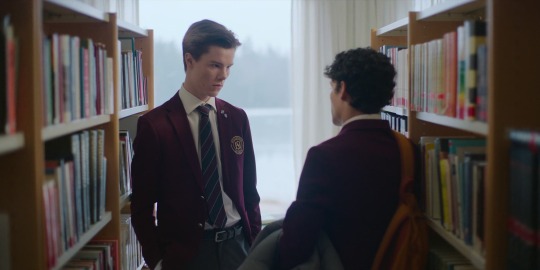
Sequence 2
Sequence tension - What is Wille gonna do with this new information?
Things are moving rather quickly here because again, this is the sequel, there’s no need to linger on the set up. So we are immediately faced with the first major plot point, the Lock-in - Wille calls the royal court and blames them for everything that’s gone wrong so far. He also makes the decision to actively fight them, by threatening to renounce the crown. This also establishes the royal court as the main antagonist for this season. August is still an antagonist, but no longer the main one. The main tension is also established.

Act 2
Act tension - How will he win Simon back?
Sequence 3
The protagonist starts this sequence having learned something new - Simon is making attempts to move on. Wille responds with petty anger. Then we get a pinch point - Jan-Olof shows up to remove Wille from Hillerska. Demonstrating the royal court's power.
Sequence tension - Can Wille stand up for himself against the crown?
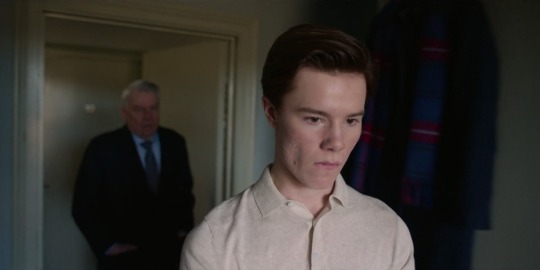
Sequence 4
The build-up towards the midpoint - Felice advises Wille to be around Simon as much as possible, to keep trying, and that he does. Like bargaining with Simon about having a secret relationship, helping Simon get a spot on the rowing team, and confronting him about his relationship with Marcus.
Sequence tension - Is Simon actually moving on?
And here comes the dreaded midpoint once again - Wille sees Simon and Marcus kiss. He now believes he’s lost Simon forever. What we could call “A false defeat”. This changes his aim from winning Simon back, to attempting to move on himself.

Sequence 5
Wille is trying to adjust to this new reality where he can no longer hope for Simon to come back to him. We could identify two pinch points here. One is the locker room fight, where Simon admits he can’t accept Wille's title. And the other is when Simon shows up at the ball with Marcus. Both of these remind Wille of the fact that he can’t be with Simon.
Sequence tension - Can Wille let Simon go?
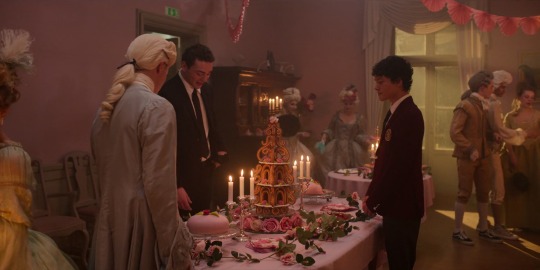
Again, some subplots advance here - Sara and August’s relationship intensifies.
Sequence 6
Starting with a plot point, a moment of reflection for our protagonist - Despite Wille’s attempts to let go, Simon runs after him at the ball. They end up kissing.
Sequence tension - They still love each other!
Wille is overjoyed by this turn of events, and for a moment believes that they can be together again.
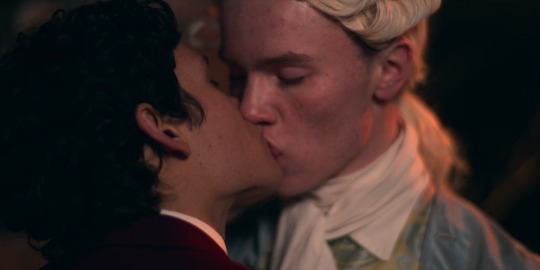
Sequence 7
Just like last time, Young Royals drags out the drama by adding an extra sequence here. A pinch point - Another reminder of the royal court's power. Kristina telling Wilhelm that August is next in line to the throne after him. Their argument in the music room could also be accounted for here.
Sequence tension - Wille is starting to realise how much his title affects Simon.
Wille’s offer to give up the crown could be more considered as a character-building moment, rather than a plot point. And Simon’s decision after this is more of a plot point in his own storyline.
The crisis that serves as build-up to act three - August threatens to report Simon for the drugs, if he reports August for the video. Wille reacts very strongly and takes it as a personal attack.
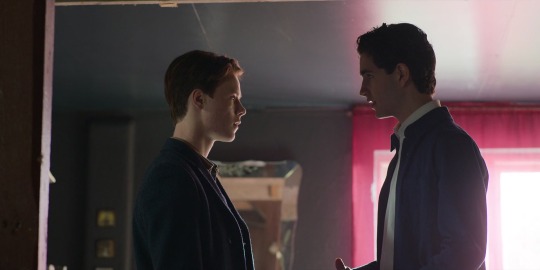
The end of act two, where the protagonist faces their biggest challenge yet - The aftermath of the field scene. Wille is alone again, Simon isn’t talking to him, and his title has badly hurt Simon once again. On top of all this, he has to do the speech.
Act 3
Act tension - Can Wille do the speech?
Sequence 8
Here the protagonist will make a big decision - Though perhaps is more Simon making the decision, to have a secret relationship.
Then we have the last major plot point, the twist - Despite the fact that Wille absolutely does not want to do the speech, he does it anyway, because he can’t let August be rewarded.
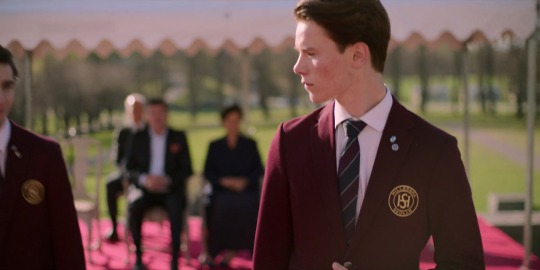
Sequence 9
Sequence tension - What is he gonna say in this speech?
The climax - Wille stops, considering the contents of the speech, and disagrees with it. He decides to admit it was him in the video.
Resolution - The smile they share I guess? But it’s still an open ending since this monumental decision leaves us with many question marks. Preparation for season 3.
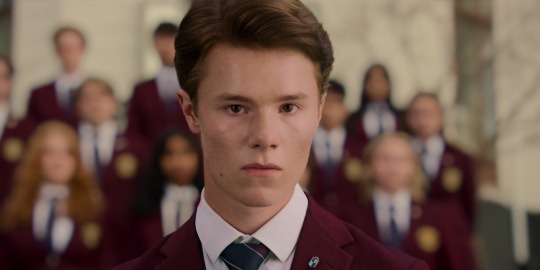
The show obviously consists of so much more than just these beats, like subplots and character-building moments. The purpose of these things should be to strengthen the characters, as well as add more depth to the main plot. Take our beloved fish scene as an example, it doesn’t really do much to advance the plot. But it’s a very good moment for solidifying Wille and Simon’s relationship! Which is important to keep us, the audience, invested in their story.
Subplots are quite interesting and tricky to get right. They tend to follow the same structure as the main plot. It’s also common for subplots to cross paths with the main plot as well, and sometimes even fundamentally affect it. However, since the main plot should always focus on developing the protagonist, you shouldn’t let any of the other character’s arcs hijack it. But you also generally don’t wanna keep the two narratives completely separate, because then the subplot might end up feeling forced and meaningless. A great example from Young Royals is the drug plotline between Simon and August. Let’s break it down real quick.
Act 1 - the deal
Set up/Hook - August approaches Simon. Clearly, they are not friends. Inciting incident - August asks Simon to get booze for him. Lock in - Even though Simon initially declined the offer, he eventually agrees to help August.
Act 2 - the money issues
Pinch point - August returns and now asks for drugs, despite being late with the payment. Midpoint - Simon learns August can’t pay him back because August is broke. Pinch point - Simon gives August more drugs to sell, so he may pay him back. Crisis - August threatens to frame Simon for the drugs after the party. (The plot lines cross and affect each other)
Act 3 - the threat
Climax - Wille manages to convince the others to frame Alexander instead. Resolution - Simon is safe (for now)
The reason why I don’t account for Simon going to see his father here is because I’d argue that them reconnecting is its own subplot, more related to Simons relationship with Sara, than it is to the August situation. It’s also an unresolved plot line still. Micke showing up at Lucia I suspect to only be their crisis point, or maybe even midpoint? Depending on how the rest of it plays out in season three of course.
Another neat trick writers may use with their subplots, is to parallel the main plot, either to highlight the themes of the story, or to explore alternative outcomes. For example, the Sara and August plotline at times resembles Wille and Simon’s plot, for very good reasons. Like how August and Wille are from similar backgrounds, yet they’re very different people. Especially at the end of season two. By that point the emotional journey August has been on, falling in love with Sara and reflecting on his wrongdoings, you’d assume he would have learned something or displayed some kind of character growth. But nope. Instead, he doubles down and causes further intentional harm to the people he’s already hurt. While Wille, in the same episode actively works to redeem himself to Simon. This is meant to strengthen Wille’s position as the protagonist we should root for, by comparing him to August, who remains to be an awful person. So even though it may feel like season two is giving more screen time to the secondary characters, that still has a purpose for the overall narrative.
Young Royals in general like to use their secondary characters to highlight the overall theme of the show. As @darktwistedgenderplural pointed out to me, widening the view of Wille’s Want vs Need to the want of being loved for who you are, and the need to be your most authentic self, we find that the same principle can be applied to all the five main characters. Despite all their journeys being unique, their wants and needs remain universal. They are all there to strengthen the theme of the show.
So what was the point of all this rambling? I don’t think it’s a coincidence that the story consists of exactly three seasons. The way I see it, since the three-act structure can be found in every element of this show, each season is also meant to represent one of the acts. Season one is the set up, season two is the confrontation, and season three will be the resolution. If we try to map out the entire show that we have so far in the structure format, you can quite quickly find the pattern.
Season 1
Set up - Wille is sent to Hillerska where he meets Simon and falls in love. Inciting incident - The video is released. Lock-in - Wille does the statement and Simon breaks up with him.
Season 2
Pinch point - The royal court proves to be a major obstacle to Wille getting what he wants. Midpoint - Wille and Simon kiss at the Valentine’s ball, proving they still have feelings for each other. Pinch point - The royal court is still trying to manipulate him, making him do the speech. Moment of reflection - Wille considers how much his title affects Simon and chooses to come out.
My theory is that at the start of season three, we’ll get to the Crisis point of the over-arcing plot. Where our protagonist will face their biggest challenge yet and be at their lowest point before the climax. And hopefully, we’ll get a proper resolution this time around! (Something more than a cliffhanger at least, please and thank you)
So even though it’s sad that our lovely little show is coming to an end, I think it’s worth looking at the bigger picture here. The writers clearly intended for it to have three seasons so that we would have a satisfying story with a clear beginning, middle, and end. There are so many examples of shows that self-sabotaged by running for way too long and not being able to keep consistent quality. But the Young Royals team got to stay loyal to their story and tell it in their way, and I think that’s beautiful.
Young Royals is a love letter to storytelling, and you can’t convince me otherwise ��
#so that was basically a free uni lecture#hope you enjoyed#young royals#wilmon#Prince Wilhelm#simon eriksson#young royals analysis#august horn#young royals season two#Film Theory#story structure#three act structure#story analysis#young royals and the three act structure#my analysis#my meta
150 notes
·
View notes
Text

Habemus the first fully functional Act One outline since I began the big re-write! I'm so excited! I went through about 50 of these before one of the plots finally passed muster. A huge shout-out to @sodaliteskull for their incredibly helpful suggestion on this post. Everything clicked into place after reading your advice! Thank you ♡ P.S. The image is blurred so I don't give the game away too soon for potential future readers out there ♡
TAG LIST: (ask to be + or - ) @the-finch-address @achilleanmafia @fearofahumanplanet @winterninja-fr @avrablake @outpost51 @d3mon-ology @hippiewrites @threeking @lexiklecksi @ashirisu @thelaughingstag
#Outline#Act-One#writeblr#writeblr community#writblr#writers of tumblr#writers on tumblr#original fiction#fantasy#writing community#wip:thesorcerersapprentice#wip: the sorcerer's apprentice#plotting#plotter#dark fantasy#fantasy fiction#fantasy novel#fantasy writer#fantasy writing#writing fantasy#novel outline#outlining#plot outline#fantasy plot outline#Act One#Three Act Structure
5 notes
·
View notes
Text
I figured out the perfect first film- join me to put it to script!!
youtube
#Xiaolin Showdown#Kids WB#2000s Cartoons#Shen Gong Wu#Xiaolin Retrospective#Retro Cartoons#Nostalgia#Hidden Gems#Animated Series#Saturday Morning Cartoons#Xiaolin Showdown Movie#Mala Mala Jong#In The Flesh Episode#Days Past Episode#Citadel of Doom Episode#Three Act Structure#Xiaolin Showdown Analysis#Action Cartoons#Classic Cartoons#Adventure Cartoons#Showdowns#Animation Breakdown#Xiaolin Characters#Early 2000s TV#Cartoon Network#Wu Hunt#Shen Gong Wu Powers#Jack Spicer#Omi#Raimundo
6 notes
·
View notes
Text
September C. Fawkes:
What is the Inciting Incident? Definition, Purpose, Examples, Tips
Unfortunately--as is somewhat common in the writing community--the term can actually be a little ambiguous, making it difficult to learn about, let alone discern. Not only are there multiple terms for the same event, but there are also disagreements in the community about which event constitutes the "inciting incident." So, if you have been confused about this term, I'm not surprised. To minimize confusion, I'll explain the different ways people view the inciting incident, later. For now, the above definition is currently what is generally considered the inciting incident.
28 notes
·
View notes
Text
The Three Act Structure
The Three Act Structure - Plotting with Three Acts #amwriting #writerslife #ThreeActStructure #WriterCommunity #Writing #Tips #WritingTips
I’ve written before about story structure and about how I structure my own stories, but I thought that I would talk a little bit about another useful (if a bit more complicated) way of structuring your story elements, the Three Act Structure. In basic terms, the Three Act Structure is separated into the three main parts of a story. The beginning – or act one, the middle – or act 2 and the end –…

View On WordPress
#3#act#creativity#Fiction#outline#people#story structure#structure#three#three act structure#Writer#writing
5 notes
·
View notes
Text
yep. ASIP is a classic heros journey structure, with john as the focus character. BBCSherlock can also be examined thru five act (incomplete) and three act structure (thesis, antithesis, synthesis). i probably have links and reblogs somewhere buried under all the good omens stuff, maybe my hashtags will work, so i'll include them all.
I always found the 7 act structure helped me a lot more than the 3 acts.
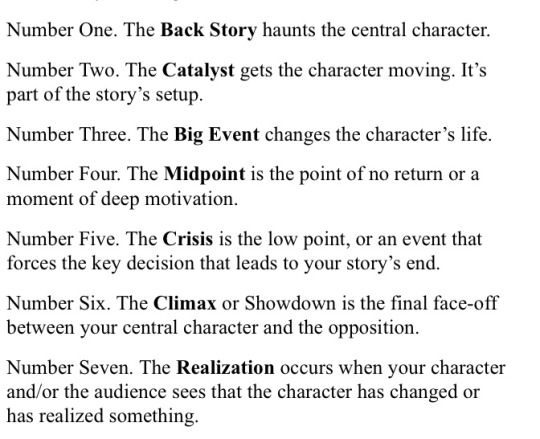
Link right here
#sherlock#tjlc#story structure#seven act structure#five act structure#three act structure#hero's journey#sherlock meta
14K notes
·
View notes
Text
Slogging through the Third Act BFG's
I listen to a lot of podcasts and watch a bunch of You Tube videos about story structure. Not because I need help, since you know I’m a world class blogger that has mastered the art of writing, but because I can’t help but criticize their incompetent and useless advice. I would start my own podcast about story structure, but I don’t like to share, and also I don’t have a good microphone. The…

View On WordPress
0 notes
Text
Ignore all that shit about heroes' journeys and such. This is the REAL three act structure if you want a successful fantasy story.

1 note
·
View note
Text
Love in the Air (Prapai x Sky) - 3 Act Structure
Love In Air is a 13ep Thai BL series produced by MeMindY and for this post I’m breaking down Prapai and Sky’s 3 Act Structure, which features in eps 8-13.
Payu and Rain’s analysis (eps 1-8) can be found in my previous post here.
Tropes - grumpy/sunshine, one night stand, rich boy/college boy, overcoming past trauma/abuse, romance as plot, evil ex returns, pursuing reluctant love interest, slow burn romance, trust issues, reformed rake, emotionally closed off uke.
Story Question - will college boy Sky overcome his past trauma and finally find love with rich boy Prapai?

Act 1 - The Ordinary World
We see Sky doing his thing - going to school, interacting with his dad and cleaning his house. Meanwhile Prapai is being an expensive rich boy, working at his dad’s company and racing bikes.
Call to Adventure Sky and his bestie Rain break into an illegal street race and are separated. When Sky is caught, Pai steps in and claims Sky is his boy to deflect punishment.
Refusal of the Call —--> Acceptance Pai asks what Sky is willing to offer to compensate his efforts. Sky knows what Pai wants - what all guys want - and they end up having sex in Pai’s condo. Sky leaves the next morning.
Crossing the Threshold After 3 months of obsessing about their encounter, Pai manages to get Sky’s number via his bestie Rain (who is the bf of Payu, Pai’s bestie) and declares he’s going to pursue him.

Act 2 - Into The New World
Allies, enemies, mentors Allies - Pai’s younger brother and sister, his PA. Sky’s building manager, Sky’s bestie, Rain, and Pais bestie, Payu. Sky’s classmates.
Sky’s internal warning system is his mentor, and his vile ex is def. an enemy. Sky is also his own worst enemy because his past experiences have given him a warped sense of relationships which have lead to him swearing off relationships.
Trials and failures, obstacles, minor victories Pai takes some time to think about how he’s going to pursue Sky, who is different to his previous love interests. He sends sunflowers and food. Sky refuses the flowers (but doesn’t throw them away), eats with Pai (but is rude and disinterested). Makes it clear he’s not into friends with benefits, so Pai should just give up. Pai doesn’t and instead tells rain he’s pursuing Sky. Rain vouches for Pai being a good guy. Sky blocks all the burner numbers Pai calls him on, throws out the food gifts. Tells himself it’s all for the best.
We see Sky’s trauma through nightmares and flashbacks, giving us an insight into his vulnerability, trust issues and refusal to have a romantic relationship.
Growing feels/learning about each other Sky’s protective walls are slowly being chipped at as Pai pursues him. Sky has moments of confusion where he’d thought Pai was like his ex but it’s clear Pai doesn’t give off the same vibes.
We see Pai’s thoughtfulness in a few ways - how he speaks and interacts with Sky, how he listens, how he notices when Sky is having an emotional flashback, the sunflower pendant he wears, which he now associates with Sky. Pai’s love language is definitely gift giving. Pai tells Sky he likes a challenge.
Pai tries to go about business as usual - school assignments, helping his classmates. Pai texts him to ask about his day and if he’s eating etc. Sky is annoyed… but you can also see the reluctant attraction blooming. His internal dialogue is meant to comfort him, assure him he’s doing the right thing by ignoring Pai’s efforts. “Don’t listen to your heart, listen to your mind”. He eventually becomes distressed by Pai’s interest and keeps having nightmares about his past trauma. He doesn’t want anyone because he doesn’t want to feel that vulnerable again. At this point, it’s unclear if Pai will overcome his past.
Becoming Emotionally Invested When Sky falls sick, Pai rushes to his side to take care of him. Pai is surprised by the feels he’s catching for Sky, realises it’s not just about sex anymore. Sky gets better and attempts to go back to his usual cold self, but Pai won’t have it. Sky asks what he wants, assumes it’s sex. Pai is offended. Sky has seen Pai’s caring side and his growing feelings surprise and confuse him. He agrees to let Pai pursue him but says he will not change his mind. Pai, however, is optimistic. Sky surprises them both with a kiss on Pai’s cheek. He’s all giddy and smiling and at this stage, it’s fair to say Sky is becoming smitten. Whereas Pai is driving full tilt down the highway towards Think I’m In Love Town.
Pai and his bestie Payu attend a race event, and we see two dudes talking with Sky. This establishes the fact that Pai knows Sky’s evil ex but not how evil he is. Pai goes to a uni event to help Sky and we see Pai realise he’s full-on head over heels for Sky.
They finally start sharing intimate stuff and talk about family. This is a huge step for Sky because it means he’s emotionally invested. There’s a near-kiss. Pai brings Sky food and takes care of him. Sky lets him, whereas before he was actively fighting it.
When Sky needs help with an assignment, Pai is the person he calls. Pai thinks Sky is in real trouble, is annoyed it’s just an assignment. Sky feels bad, apologises, but Pai is still angry and it takes a while for him to come around. All is good in the morning, and Sky rewards Pai with a kiss.
Point of no Return (where the characters are deep in it and cannot go back to their Ordinary World because too much has changed for them) Cleaning Sky’s room is a test for Pai, to see if he gives up. Of course he doesn’t, and they eventually end up in bed. Sky asks Pai to hurry up and get bored of him so he can move on. But we know deep down, Sky is desperately wanting Pai to love him. Sky doesn’t admit it, but he is emotionally committed now.
—->STORY MIDPOINT <——-
Things Have Changed / Removing the Armour / Vulnerability Sky is now in this relationship and they do couple things. Sky mentions he has an evil ex. They go out to eat, Pai picks up Sky from class. There is a confession of feels from Pai, and Sky tells him ‘I’m all yours’. It appears they are falling in love. Until….
Oh, SHIT moment |Sky sees a guy all over Pai at a party, assumes the worst. He’s devastated. Sky ghosts Pai for two weeks and Pai is so worried. When Sky says he’s bored of Pai and they should each move on, Pai is heartbroken. It appears the answer to the Story Question will be no.
ACT 3 - The New Improved World
Pai refuses to believe Sky was just using him, so he goes to Sky’s dorm, finds the diary where Sky has admitted all his insecurities and his feels for Pai. When Sky turns up there’s a massive emotional scene where Sky breaks down and cries (as do we all!!) Pai says he loves Sky. Mucho tears and emotions, they kiss and make up. Sky tells Pai that his evil ex did a number on him, had told him he was boring. This confession brings them closer.
One Last Challenge Pai and Sky are at a street race, Sky’s vile ex spots him, schemes to get him alone and attempts to rape him, all the while saying Pai has given his okay and offered Sky to him, mirroring what evil ex had done to Sky when they’d been together. Rain, Payu and Pai charge in in the knick of time, Pai rescues Sky then beats the shit out of evil ex. We all cheer.
Reflection / Resolution Sky finally tells Pai about all the vile shit evil ex did - offered Sky to ex’s friends, abused him. Pai is in tears, there’s emotions and vulnerability as they both comfort each other. Sky asks if he can really be Pai’s and his alone. Pai says of course. They hold each other.
Final AHHHHH Feel-good Moment We learn the street race boss has ‘taken care of’ evil ex and won’t bother them again (we assume he’s offed him, tbh). Sky and Pai wake up together, have a sweet moment as a loving couple, hug and kiss. Pai is at work and they have more cute moments.
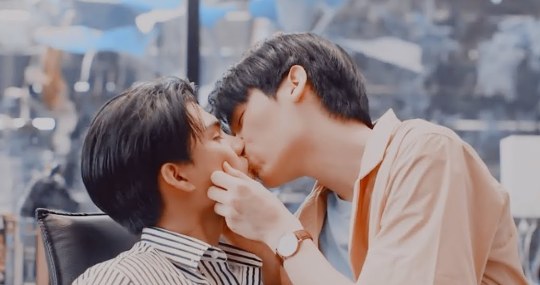
#I will 3 act structure ALL your romance as plots#love in the air#bl series#thai bl#thai boys love#mame#me mind y#writing#screenwriting#story structure#three act structure#romance is the plot#comfort watch#comfort couple#peat wasuthorn#prapaisky#paisky#prapai x sky#prapai love in the air#prapai lita#sky lita#sky love in the air#fort thitipong sengngai#lita
8 notes
·
View notes
Text
The Three Act Structure
The Three Act Structure - Plotting with Three Acts #amwriting #writerslife #ThreeActStructure #WritingCommunity
I’ve written before about story structure and about how I structure my own stories, but I thought that I would talk a little bit about another useful (if a bit more complicated) way of structuring your story elements, the Three Act Structure. In basic terms, the Three Act Structure is separated into the three main parts of a story. The beginning – or act one, the middle – or act 2 and the end –…
#3#act#creativity#Fiction#outline#people#story structure#structure#three#three act structure#Writer#writing
0 notes
Text
What is Plot?
Simply put, a plot is “the main events of a play, novel, movie, or similar work, devised and presented by the writer as an interrelated sequence.” As opposed to a timeline, which depicts events in a purely chronological order, the sequence of events in the plot is chosen specifically by the writer. It can jump forward or backward in time as the writer sees fit. Strictly speaking, a plot is only…

View On WordPress
#book planning#fiction#plot#plot diagram#the writing process#three act structure#what is plot?#writing#writing a book#writing advice#writing plot
1 note
·
View note
Text
EXACTLY, that is precisely the parallel the text hands us, with all the references to jane austen, including the "mastermind" bit.
Hey, so are we gonna talk about how Aziraphale asking Crowely to join him in heaven is very reminiscent of Mr. Darcy's first proposal, ya know the "I love you against my better judgment" one?
Are we gonna talk about how after the first failed proposal, Darcy works on himself and learns that he loves Lizzie because of who she is, not in spite of it.
All I'm saying is Jane Austen (and specifically Pride and Prejudice) kept popping up a lot in this season, and I don't think it was just so they could have a ball.
#good omens#gos2spoilers#ineffable husbands#story structure#three act structure#jane austen#pride and prejudice
1K notes
·
View notes
Text
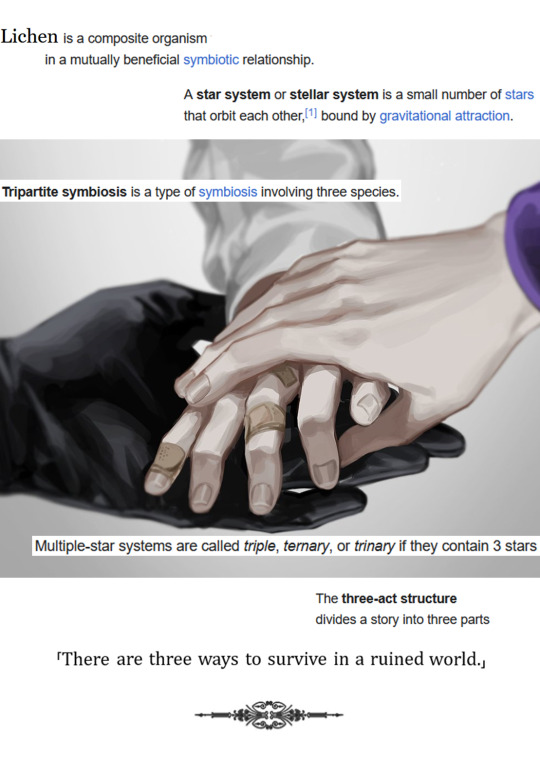
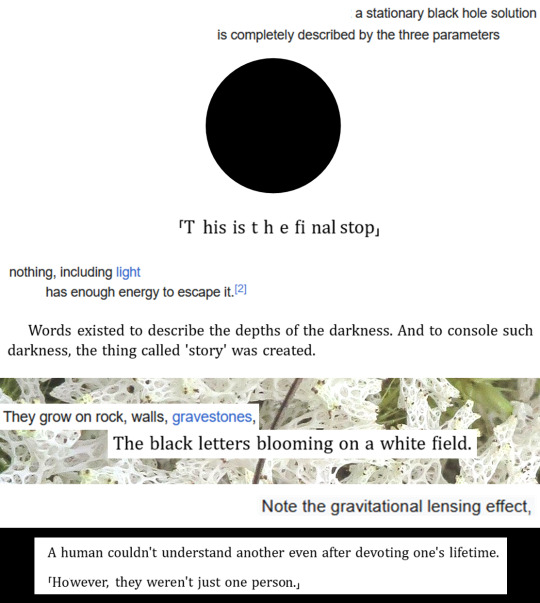

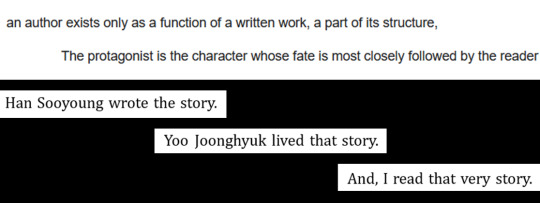
Triptych
#do. do you see my vision#orv#omniscient reader's viewpoint#aj arts#orv spoilers#i guess#anyway this was very fun#wikipedia poem#yoohankim#text is from the Wikipedia pages for:#lichen. star system. polaris. black hole. author. protagonist#and tripartite#lichen can be a symbiosis of fungi and algae or cyanobacteria; or it can have all three#gravitational lensing is the term for the visual distortion around black holes as it bends light. some of it gets mirrored#youll see it in artist renditions of black holes#wait i also used a line from the page for three act structure
2K notes
·
View notes
Text
The Percentage Plot Structure (or the Movie Plot Structure)
The Percentage Plot Structure (or the Movie Plot Structure) #amwriting #writerslife #WritingCommunity #Outline #Outlining #stories #writingtips #writercommunity #writingadvice
Hi all, I hope you’re well! Today I’m going to talk about the ‘Percentage Plot Structure’ also known as the ‘Movie Plot Structure’. It is a nice, easy way of outlining and structuring your plot in three acts, making sure all the important plot points are in the right places. The Percentage Plot Structure As I said above, this plot structure uses three acts. Each act takes up a percentage of your…

View On WordPress
0 notes